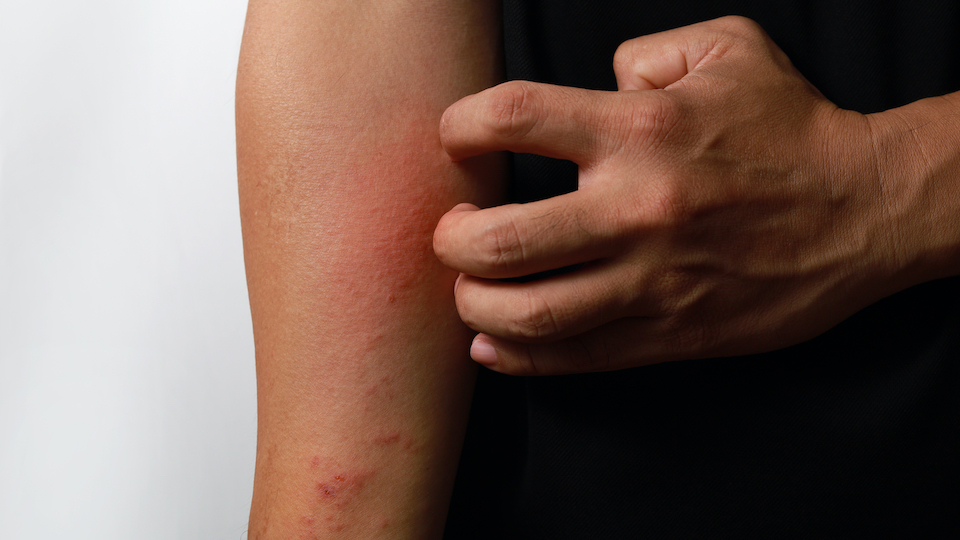Eczema, also known as atopic dermatitis, is a common skin condition that can cause discomfort and irritation. It usually presents itself in the form of red patches on the skin accompanied by dryness and itchiness.
For those living with eczema flare-ups, managing their symptoms can be challenging. Fortunately, there are ways to ease and prevent these episodes from occurring.
In this article, we will discuss how to reduce your risk of getting an eczema flare-up while providing tips to help you manage them when they occur. We hope that these strategies will give you relief from the itchy discomfort associated with eczema flare-ups!
Understand the Triggers of Eczema Flare-Ups

Understanding the triggers of eczema flare-ups is key to helping ease and prevent them. Common triggers for eczema flares include irritants like soaps, detergents, perfumes, sweat, and certain fabrics.
Stress can also cause or worsen symptoms of eczema. For some people, foods such as dairy products, eggs, soy products, and wheat may be a trigger.
Temperature changes are another common factor that can cause an exacerbation of existing skin irritation in people with eczema. It’s important to identify any potential triggers your body might respond negatively to to help prevent future flare-ups from occurring.
If youre unsure of what elements could be causing your flare-ups it may be beneficial to consult with a doctor who specializes in this area of medicine for personalized advice on how best to manage your condition.
Maintain a Healthy Diet and Exercise Routine

Maintaining a healthy diet and exercise routine is an important part of managing eczema flare-ups. Eating nutritious meals consisting of fresh fruits, vegetables, lean proteins, and whole grains helps to nourish the skin from within.
Exercising regularly can not only help you maintain a healthy weight but also reduce stress levels – which are often attributed to exacerbating eczema symptoms. Additionally, it is important to avoid certain triggers that may cause an outbreak such as dairy products or certain soaps – as this will help manage your condition more effectively.
Taking these simple steps in combination with regular doctor visits should not only ease any current flare-ups but also prevent future outbreaks from occurring.
Create an Appropriate Skin Care Regimen

Creating an appropriate skin care regimen can be a great way to ease and prevent eczema flare-ups. Start by understanding your triggers, which could include environmental factors, stress, or certain foods.
Once you’ve identified your triggers, create a plan that works for you to avoid those situations or substances. For instance, if your eczema is caused by cold weather, wear protective clothing when going outside on colder days.
In addition to avoiding potential triggers, choose gentle skin care products that won’t irritate the skin further. Products with fewer ingredients are best since they reduce the risk of triggering allergies and sensitivities associated with eczema flares.
Look for natural options containing soothing ingredients like oatmeal and aloe vera as well as moisturizers designed specifically for dry skin conditions such as petroleum jelly or mineral oil lotions/creams instead of fragranced body washes or soaps that contain harsh chemicals like sulfates and parabens. Lastly, consider opting out of exfoliating scrubs altogether when managing eczema – opt for light cleansing cloths instead!
Develop Strategies to Manage Stress and Anxiety

Developing strategies to manage stress and anxiety can be a key component of easing and preventing eczema flare-ups. Stress can trigger or worsen skin inflammation, so it is essential to learn how to cope with stress in healthy ways.
Start by making time for yourself each day – whether that means taking a walk in nature, reading a book, listening to music, or engaging in any other activity that helps you relax. Taking deep breaths when feeling anxious can also help reduce tension throughout the body while calming your mind.
Additionally, try practicing mindfulness meditation as this is very effective at reducing stress levels. If necessary, seek professional support from therapists who specialize in helping people manage their emotional well-being.
When implemented regularly these strategies will help bolster resilience and lead to healthier skin overall!
Identify Products That Can Help Prevent Flare-Ups

When it comes to preventing eczema flare-ups, several products can help. Emollients and moisturizers are the most commonly used treatments for eczema as they keep skin hydrated and protect against further irritation.
There is a range of emollient creams, lotions, ointments, or gels available that contain different ingredients such as shea butter or coconut oil. For those who prefer natural remedies, colloidal oatmeal baths are beneficial in reducing symptoms associated with eczema such as itching and inflammation.
Non-steroid topical steroid creams may also be prescribed by your doctor if needed. If you suffer from frequent flare-ups due to allergies then antihistamines may provide relief from itchiness caused by histamine release during an allergic reaction.
Additionally, UV light therapy has been found to reduce the severity of some types of eczema so using sun protection when outdoors is important too!
Conclusion

In conclusion, eczema is a condition that can cause uncomfortable and painful flare-ups. Fortunately, there are many ways to help ease the symptoms of eczema.
By avoiding triggers such as certain fabrics or soaps, using natural remedies like aloe vera and coconut oil, maintaining a healthy diet full of anti-inflammatory foods, and regularly applying eczema cream to affected areas you can effectively manage your eczema flare-ups.







